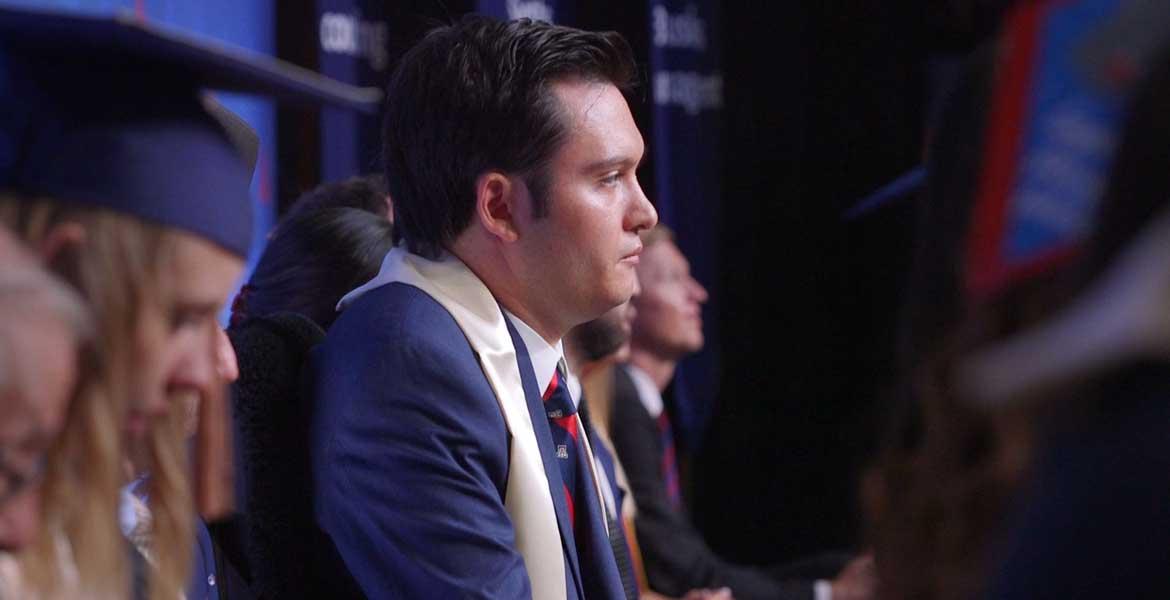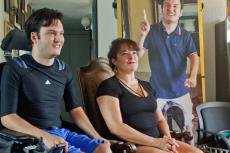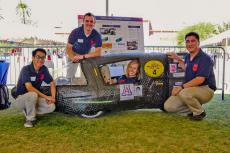After 20 Years in a Wheelchair, UA Student Walks at Graduation
Jeffrey Bristol had his first brain aneurysm when he was 2 ½ years old, and doctors said the toddler probably would never get out of bed on his own again. Thirteen days later, his neurologist almost fell over in surprise as Jeffrey ran up to greet him.
Brain aneurysms, or bulges in blood vessels that can be life threatening when they burst, are very rare in children.
When Jeffrey suffered the rupture of a second brain aneurysm a year later, doctors said the same thing. But his mother, Hermelinda Bristol, shrugged it off. Her son was a fighter -- she knew he’d get back on his feet.
It just took a bit longer than she anticipated.
Jeffrey got around exclusively by wheelchair until he was 22. Thanks to a University of Arizona College of Engineering senior design team, the advocacy of Hermelinda and -- most of all -- Jeffrey’s hard work and determination, the 24-year-old took a few steps across the stage May 11, 2019, to receive his diploma from the UA’s Eller College of Management.
“You have to have the motivation to get up each day and improve and eventually obtain what you want,” said Jeffrey, who earns As and Bs in most of his classes and is thinking about returning to the UA for his master’s degree. “My motivations come from what I want to do when I can walk all the time, like playing tennis.”
Executing a Mom’s Engineering Ideas
Jeffrey’s second aneurysm damaged his brain’s ability to send messages to his muscles, but it didn’t affect the muscles themselves. Relearning to walk has been a process of reminding his brain and his muscles how to talk to each other.
Using everything from a skateboard to a motorcycle spring and weightlifter’s belt, Hermelinda created makeshift devices throughout her son’s childhood to help him stand upright. She even hung carabiners from the living room ceiling to hold Jeffrey up so he could play Wii with his younger brothers.
I've had the idea of walking at graduation in my mind from the beginning."
Hermelinda approached the UA Engineering Design Program in 2016 about creating a device to help Jeffrey walk, and donations for the $10,000 sponsorship fee poured in from family and friends. She selected six engineering students with the right blend of heart and technical know-how for the senior design project. The team created a 20-pound “lightning legs” exoskeleton to support Jeffrey’s feet, legs and waist. The waist apparatus, said Hermelinda, was the key element: It held Jeffrey’s torso upright so he wouldn’t lean forward and lose his balance every time he tried to take a step.
Within two weeks of beginning to use the exoskeleton in spring 2017, Jeffrey could stand on his own and maintain his balance. He demonstrated the rig to a crowd at Engineering Design Day 2017, and the design team won an engineering ethics award.
Shedding the Exoskeleton, Piece by Piece
Inspiring quotes and messages are scattered throughout the Bristols' home. A “Star Wars” poster in Jeffrey’s room features the famous line “Do or do not: There is no try.” A poem hanging on the kitchen fridge is titled “Don’t Quit.” The family lives these values every day.
Once the crowds were gone and the design team members had graduated, Jeffrey kept working hard. After nine months, he and Hermelinda tried taking off the waist piece to see if Jeffrey could walk without it.
He couldn’t. Hermelinda went to bed crying, and praying.
“On the next run, the next day, he walked,” she said. “Two months before, his brain didn’t know certain things, and now they were happening.”
These days Jeffrey wears only the foot pieces. He practices walking across the tile floor of his living room every day of the week except Sunday. So far, according to Hermelinda’s records, he’s made the trek more than 230 times. His steps grow a little longer and more confident each day.
“It’s been amazing to watch how fast the pieces have come off and how clearly things in his brain have started to change,” Hermelinda said.
Putting the Invention to Work for Others, Too
Now the devoted mom is hoping the device will help more people. She’s working with Tech Launch Arizona, or TLA, the university’s commercialization arm, to pursue a patent and license the invention to a company that will bring it to the world.
“It’s having an astounding impact on Jeffery’s future, and others will learn to walk as a result of all the hard work,” said Bob Sleeper, TLA licensing manager for the College of Engineering.
It has been a long haul, but Jeffrey’s determination has seen him through relearning to hold a pencil, graduating from high school, excelling in college and learning to walk again.
“I always expect to do better each time I walk,” Jeffrey said. “I’ve had the idea of walking at graduation in my mind from the beginning.”
Read more about Jeffrey's journey at the Arizona Republic.




